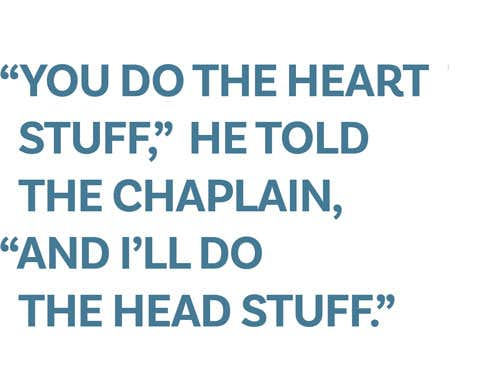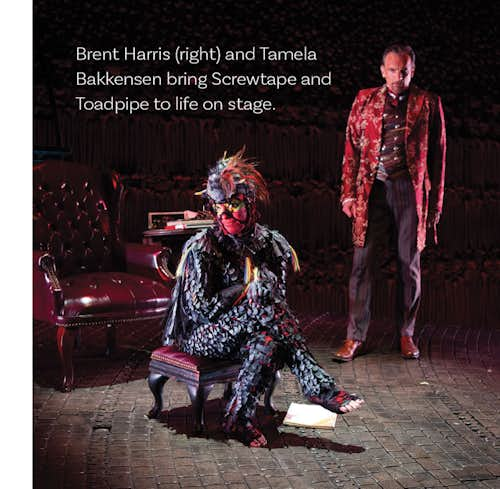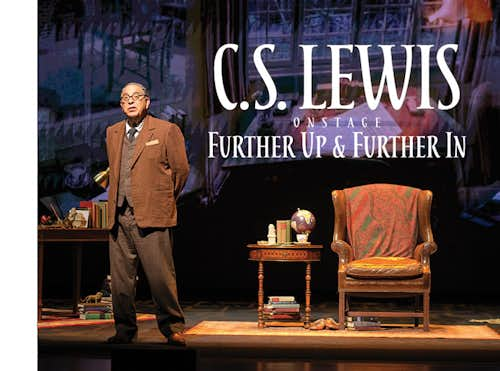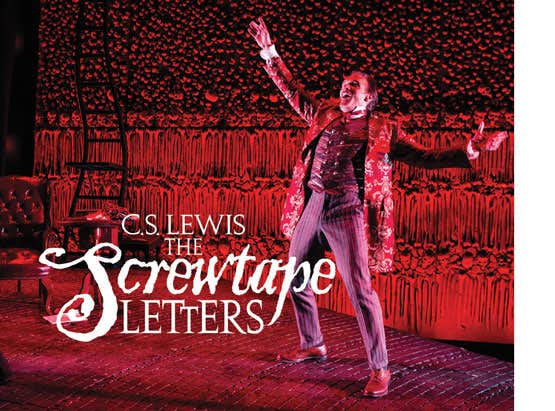Screwtape and
Further Up Reviews
Editor’s Note: Bethel McGrew is a freelance writer, teacher, maths Ph.D., cultural critic and self-described “bad Anglican.” Her work can be found at National Review, First Things, World, Plough, The Spectator, The Critic, Quillette, Patheos or on her own insightful Substack, Further Up.
When a chaplain asked C.S. Lewis if he could give an “evangelistic appeal” to his audience for one of his RAF lectures, Lewis demurred that he wasn’t the right man to ask. Not that he had anything against direct evangelistic appeals— they were all very well and good— it just wasn’t for him to make them. “You do the heart stuff,” he told the chaplain, “and I’ll do the head stuff.”
That endearing line is quoted in the play C.S. Lewis On Stage: Further Up & Further In. It aptly captures both Lewis’ appeal and his modesty. He knew exactly what he was and what he wasn’t. He wasn’t a preacher. He was a teacher.
Shuffling around in slightly baggy clothes, shoulders subtly stooped, Max McLean convincingly channels C.S. Lewis the teacher—unpretentious, methodical, robustly memorable. The script selects some of Lewis’ best prose passages and organizes them into a loosely cohesive whole. There’s a natural limit to just how cohesive such a project can be, but, then again, there’s a certain charm in the sense that we’re following the great writer’s train of thought as he strolls comfortably from one topic to the next.
Some “connecting tissue” is provided by biographical narration, lightly summarizing Lewis’ initial rise to fame with his broadcast talks, his ministry through letters and a story of a miraculous healing.
The middle of the play focuses on Lewis’ correspondence with a young man who expresses objections to Christianity but who eventually comes to faith.
 Lewis’ words are partly drawn from his letters, partly from his essays, sometimes slightly adapting, rather than delivering the original words verbatim. This is a difficult experiment. Anyone familiar with Lewis’ prose knows that he takes his time to develop a thought, sometimes slowly unfolding it over several pages. It’s, perhaps, not surprising that, in the delicate process of gleaning, condensing and quilting all this material into one self-contained piece, the occasional interpretive stumble slips through. An extended passage on “cancer and atomic bombs” was originally just about atomic bombs, which remains clear in explicitly tailored surrounding context that doesn’t apply to an old natural evil like cancer (as opposed to a frightening new kind of evil, come to remind us of “things we had nearly forgotten”), but, on the whole, it’s surprising how well the concept works in execution.
Lewis’ words are partly drawn from his letters, partly from his essays, sometimes slightly adapting, rather than delivering the original words verbatim. This is a difficult experiment. Anyone familiar with Lewis’ prose knows that he takes his time to develop a thought, sometimes slowly unfolding it over several pages. It’s, perhaps, not surprising that, in the delicate process of gleaning, condensing and quilting all this material into one self-contained piece, the occasional interpretive stumble slips through. An extended passage on “cancer and atomic bombs” was originally just about atomic bombs, which remains clear in explicitly tailored surrounding context that doesn’t apply to an old natural evil like cancer (as opposed to a frightening new kind of evil, come to remind us of “things we had nearly forgotten”), but, on the whole, it’s surprising how well the concept works in execution.
The play really hits its stride with some unexpected gold from the under-appreciated essay, The World’s Last Night, which compares life to a stage play that could be ended at any moment by Christ’s Second Coming. This practically begs to be turned into theater, and it provides the sort of strong dramatic high point a largely understated project like this requires. Selections from the famous sermon, The Weight of Glory, are similarly effective, movingly guiding the play to a close, with some of Lewis’ most beloved and poignant reflections on the afterlife.
The production is greatly enhanced by a series of stunning backgrounds, sometimes offering a tranquil view from Lewis’ Oxford window, sometimes evoking the majesty of a cathedral full of stained glass or even flinging the audience into outer space. Biblical imagery vividly complements passages reflecting on both the New and Old Testaments, from scenes of Christ’s life to Mt. Sinai. We actually see the “smoke on the mountain” that would inspire Joy Davidman’s book by that name.
At opportune moments, the play also benefits from some well-composed music: always complementary, never intrusive. Even the props are assembled with a sharp eye for detail. Look closely, and you’ll spot a pair of old slippers by Lewis’ armchair. A couple of decorative lions also make nice Easter eggs, along with a few first editions of Lewis’ own books. Like the backgrounds, these elements do precisely what they’re supposed to do: elevate the performance without decentering it.
Unlike his close friend and colleague, J.R.R. Tolkien, Lewis was never caught on camera for posterity. We are left only with recordings of his voice, from which McLean has clearly drawn heavily to build his impression. This is a sadness for readers who will always wonder what it might have been like to watch him lecture, but, through McLean’s performance, they can get a satisfying taste.
Editor’s Note: Olivia Murray covers the D.C. theatre scene for BroadwayWorld and wrote this review for FPA’s Sept. 16, D.C.-area production. Reprinted with permission.
Fellowship for Performing Arts has given us the opportunity to see C.S. Lewis’ iconic The Screwtape Letters come to life in their staged production of the tale for one day only. Hosted by Capital One Hall, we were transported into the hellish environment in which our lead antagonist, Screwtape, played by Brent Harris, sends letters back and forth to his demon apprentice, Wormwood, in hopes to wreak havoc on an unfortunate soul on Earth.
An interesting story, only told through Screwtape and his sidekick, Toadpipe, played by Tamala Bakkensen, where we see the struggle of a veteran demon seem to meet his match with “The Enemy,” otherwise known as God, through the life of the client on Earth. This production was impressively pieced together. From the acting, set design, costume design and technical aspects, it’s as if we were transported to Hell for the evening and left questioning various themes of life.
Harris gives a devilishly impressive performance embodying Screwtape and his wild antics throughout the show. We see him break down a once proud and confident character into an almost skeptical shell of what he used to be. The way Harris went about this character was extremely captivating and thrilling to watch. We witnessed the moments when Screwtape began to “crack” as his apprentice’s client continued to hurdle the obstacles they tried to throw at him. The critical study of this perplexing character by Harris was apparent. Each movement, maniacal laugh and breakdown was clearly expertly pieced together by this very talented actor. Bringing a character to life for the first time can be a challenge, but Brent Harris proved that he was the right man for the job.
 Alongside Harris was the spectacular talent of Bakkensen, who played an integral character in this revitalization of the story. Toadpipe is a devil who is also Screwtape’s secretary, but, in this production, Bakkensen does not make Toadpipe a simple secretary. This amusing character brings comic relief to the rather dark story and helps personify the hesitation implied when regarding some of Screwtape’s interesting suggestions to Wormwood. Bakkensen brought this show to life through her animal-like movements and vocalizations, while also helping to create a visualization of some of Screwtape’s ideas. Her performance certainly brought this incredible production to another level.
Alongside Harris was the spectacular talent of Bakkensen, who played an integral character in this revitalization of the story. Toadpipe is a devil who is also Screwtape’s secretary, but, in this production, Bakkensen does not make Toadpipe a simple secretary. This amusing character brings comic relief to the rather dark story and helps personify the hesitation implied when regarding some of Screwtape’s interesting suggestions to Wormwood. Bakkensen brought this show to life through her animal-like movements and vocalizations, while also helping to create a visualization of some of Screwtape’s ideas. Her performance certainly brought this incredible production to another level.
Each aspect utilized to put this story together was clearly meticulously thought out and was very successful. The entire production should be very proud of this show, and I should hope to see that it eventually sticks around for a while. A two-person show can be difficult to put together, but this performance went off without a hitch.



